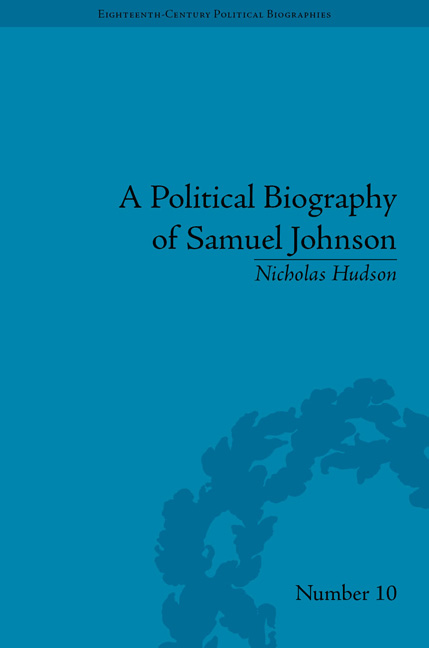Book contents
- Frontmatter
- CONTENTS
- Dedication
- Acknowledgements
- Note on the Text
- Introduction
- 1 Political Origins, 1709–36
- 2 The Patriot Opposition, 1737–9
- 3 An Independent Voice, 1740–55
- 4 The Seven Years War, 1756–63
- 5 Defender of King and State, 1763–70
- 6 Troubles of Empire, 1771–84
- Conclusion
- Notes
- Works Cited
- Index
Introduction
- Frontmatter
- CONTENTS
- Dedication
- Acknowledgements
- Note on the Text
- Introduction
- 1 Political Origins, 1709–36
- 2 The Patriot Opposition, 1737–9
- 3 An Independent Voice, 1740–55
- 4 The Seven Years War, 1756–63
- 5 Defender of King and State, 1763–70
- 6 Troubles of Empire, 1771–84
- Conclusion
- Notes
- Works Cited
- Index
Summary
Samuel Johnson never held political office and cannot be said to have exerted influence as an insider in eighteenth-century government. From his own lifetime to the present, however, his writings and conversation on political topics have raised enormous controversy. In the decades after his death in 1784, hostility or allegiance to his memory could virtually define a person's position as either a Whig or a Tory, a radical or a conservative. Two major participants in the Reform Bill debate in 1831, the Whig Thomas Babington Macaulay and the Tory John Wilson Croker, made Johnson the battleground for their opposed ideologies. In the Edinburgh Review, Macaulay mauled Croker's new edition of Boswell's Life of Johnson, excoriating the editor's supposed mistakes, but also characterizing Johnson as ‘a bigoted Tory’. Of Johnson Macaulay wrote that ‘The characteristic peculiarity of his intellect was the union of great powers with low prejudices’. Sceptical of false claims on most matters, Johnson was overtaken by irrational passions when faced with political ideas that Macaulay regarded as progressive. Croker replied in Blackwood's Edinburgh Magazine, mostly defending his accuracy but also indicating that Macaulay's savage review reflected his own inveterate prejudices. As Croker scoffed in the voice of a comic rustic, ‘Fee! faw! fum! I smell the bluid of a pairty man’.
- Type
- Chapter
- Information
- A Political Biography of Samuel Johnson , pp. 1 - 8Publisher: Pickering & ChattoFirst published in: 2014



